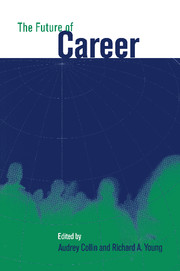Book contents
- Frontmatter
- Contents
- Notes on contributors
- Acknowledgements
- 1 Introduction: framing the future of career
- Part 1 Changing contexts
- Part 2 New perspectives
- 7 The future of boundaryless careers
- 8 Career development in a changing context of the second part of working life
- 9 The future of women's career
- 10 Career or slide? Managing on the threshold of sense
- 11 Epic and novel: the rhetoric of career
- Part 3 New directions for theory, practice and policy
- Author index
- Subject index
9 - The future of women's career
Published online by Cambridge University Press: 06 January 2010
- Frontmatter
- Contents
- Notes on contributors
- Acknowledgements
- 1 Introduction: framing the future of career
- Part 1 Changing contexts
- Part 2 New perspectives
- 7 The future of boundaryless careers
- 8 Career development in a changing context of the second part of working life
- 9 The future of women's career
- 10 Career or slide? Managing on the threshold of sense
- 11 Epic and novel: the rhetoric of career
- Part 3 New directions for theory, practice and policy
- Author index
- Subject index
Summary
Despite the many changes in the organisation of work since the early 1980s, women continue to face a range of obstacles in their careers and career opportunities (Adkins, 1995; Dale, 1990). It is relatively easy to demonstrate areas of work where women have achieved success (White, Cox, & Cooper, 1992), for example in higher education, with several women now holding Vice Chancellorships of Universities, and in finance and accountancy where women appear to be able to achieve board-level appointments. However, it is extremely difficult to assess whether women's route to ‘success’ is different to men's and, if it is, how that difference is experienced by women. Considering the defining features of ‘successful’ women identified by some research (for instance, see Nicholson & West 1988; White et al., 1992) as, relative to their male counterparts, more likely to be single or childless or to have children late, it seems likely that women's route to ‘success’ is somewhat different to that of men's. These factors, of course, not only differentiate ‘successful’ women from ‘successful’ men but also from less ‘successful’ women. Drawing on the literature of gender and work, this chapter will argue that, in part, this is due to the fact that the notion of career ‘success’ is traditionally defined in what are male terms. The chapter examines the issue of power in the work place and its implications for women's career and considers what contribution a feminist understanding of career might make to the future of work and social arrangements.
- Type
- Chapter
- Information
- The Future of Career , pp. 130 - 143Publisher: Cambridge University PressPrint publication year: 2000
- 34
- Cited by

